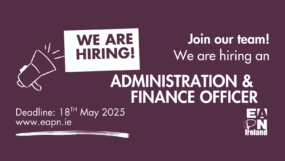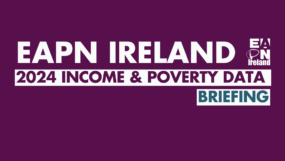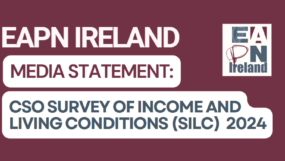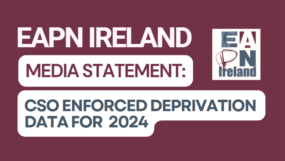Budget 2024: EAPN Ireland Media Statement

BUDGET 2024: WASTED OPPORTUNITIES OUTWEIGH ANY POSITIVES
With Budget 2024, the Government has once again failed to rise to the challenges of effectively and meaningfully addressing poverty and social exclusion, the European Anti-Poverty Network said in response to today’s Budget announcement.
“By prioritising short-term, one-off payments over adequate and sustainable permanent measures that would enable Ireland to meet its anti-poverty targets, Budget 2024 is another in a long list of missed opportunities. The Government had the opportunity, based on overwhelming evidence, to effectively tackle the cost-of-living crisis, as well as to take steps to address the underlying and structural causes of poverty and social exclusion. It has quite simply chosen not to,” said Paul Ginnell, Director of the European Anti-Poverty Network (EAPN) Ireland.
“The Budget is a crucial opportunity to ensure the state’s resources are invested in moving society in the right direction, for tackling the problems we face, and building towards a sustainable future. Unfortunately, too many of today’s Budget announcements, particularly the inadequate welfare reforms and level of tax cuts, are pushing us in the wrong direction when it comes to tackling poverty, inequality and social exclusion. This will make it next to impossible for the Government to achieve the targets in its own anti-poverty strategy, the Roadmap for Social Inclusion, which aims to reduce the national consistent poverty rate to 2% or less and to make Ireland one of the most socially inclusive States in the EU by 2025.”
“The one-off payments announced today will provide some relief to households struggling in the face of rising living costs. However, they are no substitute for ensuring everyone has an adequate income. For those in work this means decent, liveable wages. For those partially or fully dependent on social welfare, this means welfare supports set at a level that meets the cost of living. The failure to effectively address income adequacy will mean many low-income households, disabled people, lone-parent families, and other people experiencing poverty, will continue to be left behind, with incomes that fall far below the cost of living. This will push more people further into poverty,” said Mr Ginnell.
“Given the rate of inflation, the €12 increase to core social welfare rates will do little to nothing to bring people closer to income adequacy, let alone to tackle the deepening poverty being experienced across the country. Along with other anti-poverty organisations, we recommended an increase of €27.50 to core social welfare rates. This is the absolute minimum increase needed just to keep up with inflation, so the €12 adjustment is actually a real term cut. We urgently need a broader strategy to benchmark all core social welfare rates in Ireland against a level which is adequate to lift people above the poverty line and provide them with a Minimum Essential Standard of Living (MESL),” said Mr Ginnell.
“The €1.40 per hour increase in the National Minimum Wage to €12.70 is a welcome step. However, it is still some way off the €14.80 per hour living wage recommended by the Living Wage Technical Group as the amount needed for a minimum acceptable standard of living in 2023/2024. We need to move toward a real living wage to help workers meet the cost of living.”
“We welcome the announcement of and commitment to measures with the aim of tackling child poverty, including the further 25% reduction in childcare costs, the expansion of the hot school meals programme, and the inclusion of Junior Cycle students in the free text book scheme from September 2024. However, the announcement that the Qualified Child Increase (QCI) will only rise by €4 for all children is deeply disappointing. An increase of €10 per week for children under 12 years of age and €15 per week for children 12 years of age and over is needed to retain the purchasing power of the Qualified Child Payment and make real progress on tackling child poverty. The announcement a one-off lump-sum payment to each child in receipt of the QCI will not make enough of a difference to counteract what is a real-term cut,” said Mr Ginnell.
ENDS
Contact: Tim Hanley, Policy and Communications Officer: 0863316608 / tim.hanley@eapn.ie
NOTES:
The European Anti-Poverty Network (EAPN) Ireland is a network of 164 local, regional and national anti-poverty organisations and individuals. It is the Irish national network of the European Anti-Poverty Network (EAPN), which links groups fighting for the eradication of poverty across Europe. The Mission of EAPN Ireland is: ‘To put the eradication of poverty at the top of the Irish and European policy agenda and empower groups working to end poverty to understand and influence policy-making.’
The Roadmap for Social Inclusion 2020-2025 aims to reduce the national consistent poverty rate to 2% or less and to make Ireland one of the most socially inclusive States in the EU by 2025: www.gov.ie/pdf/?file=https://assets.gov.ie/46557/bf7011904ede4562b925f98b15c4f1b5.pdf
The Central Statistics Office (CSO) Survey on Income and Living Conditions (SILC) for 2022 showed that 5.3% of people (or more than 271,500 people) were living in consistent poverty, up from 4.0% in 2021 (up over 70,000 from 2021). The CSO Survey on Income and Living Conditions (SILC) 2022 is available here.
Data from the Vincentian MESL Research Centre shows that an adjustment of €27.50 was needed to restore the real value of core working age payments to 2020 levels but may need to rise to €31 at the end of 2024 depending on forecast inflation. The data also shows that an increase of €8.50 for children under 12 and €12.50 for children over 12 is needed to restore the Qualified Child Payment to 2020 levels in real terms. These figures assume that the €100 increase in the Back-to-School Clothing and Footwear Allowance will be retained. The rate recommendation above these rates stems from the need to make progress on tackling child poverty, particularly among older children. The cost of the basket of goods needed to ensure Minimum Essential Standard of Living has risen by 18.9% since 2020. https://www.budgeting.ie/publications/mesl-2023/
Recent posts
- EAPN Ireland is hiring an Administration and Finance Officer
- EAPN Ireland Briefing: 2024 Income and Poverty Data
- URGENT ACTION NEEDED FROM GOVERNMENT AS LATEST DATA SHOWS POVERTY INCREASED IN 2024
- Fall in Deprivation in 2024 welcome, but is still the reality for almost 830,000 people
- SOCIAL INCLUSION FORUM 2025 – CWI/EAPN Ireland Preparatory Workshops






